- HOME
- Technical Information
- TORAYCON™ PBT Resin
- Thermal properties
Thermal properties
Thermal properties
Table 6 shows the thermal properties of Toray's TORAYCON™ PBT resin.
| Category | Unit | Non-reinforced grade | Glass-fiber reinforced grade | |
|---|---|---|---|---|
| 1401X06 | 1101G-30 | |||
| Melting point | °C | 224 | 224 | |
| Linear expansion coefficient | 10-5/°C | 9.4 | 2.0 | |
| Deflection temperature under load | 0.45MPa | °C | 154 | 220 |
| 1.82MPa | °C | 58 | 212 | |
| Heat-sag temperature | °C | 190 | 220 | |
Ⅰ. Deflection temperature under load
As mentioned earlier, TORAYCON™ has a high melting point (224°C) and exhibits a high deflection temperature under low loads relative to other non-reinforced grades.
The glass-fiber reinforced grade exhibits a deflection temperature (212°C) under high loads that is close to its melting point.
Figure 13 shows heat sag temperature under no load. The values shown are extremely high--190°C for the non-reinforced grade (1401X06) and 220°C for the glass-fiber reinforced grade (1101G-30).
Even under high temperatures, TORAYCON™ is the most heat-resistant among thermoplastic resins. That makes TORAYCON™ the best resin for applications requiring exposure to high temperatures for extended durations of time.
Figures 14 and 15 compare the deflection temperatures under load of different resins.
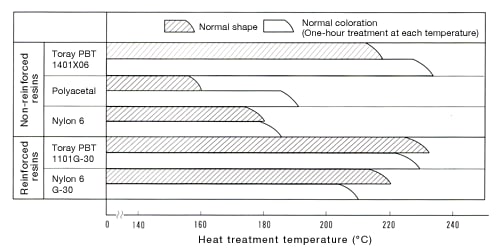
Figure 13: Heat-sag and discoloration temperatures for different types of plastics
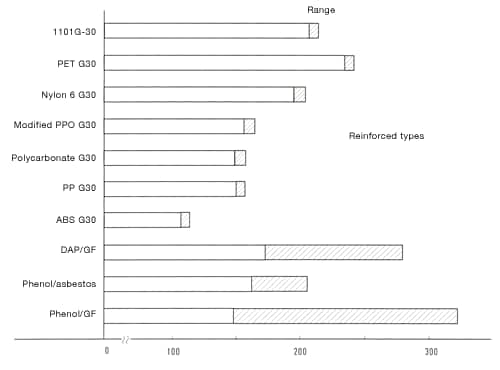
Figure 14: Deflection temperature under load (1.82 MPa) of different plastics (reinforced types)
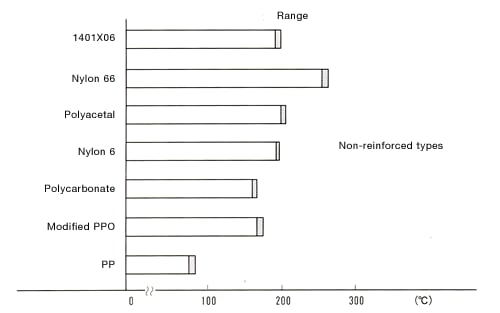
Figure 15: Deflection temperature under load (0.45 MPa) of different plastics (non-reinforced types)
Ⅱ. Resistance to thermal degradation
TORAYCON™ PBT resin exhibits superb heat-resistance and little deterioration of physical properties when exposed to high temperatures for extended durations of time.
Figures 16-1 through 16-3 and 17 show the dry-heat resistance properties of TORAYCON™.
The glass-fiber reinforced grade (1101G-30) withstands continuous use at 130-150°C and can even be used in applications requiring exposure to 200°C intermittently or for short durations of time.
The non-reinforced grade (1401X06) withstands continuous use at 120-140°C and can be used in applications requiring exposure to 170°C intermittently or for short durations of time.
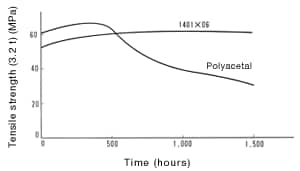 Figure 16-1: Dry-heat resistance of 1401X06 (130°C)
Figure 16-1: Dry-heat resistance of 1401X06 (130°C)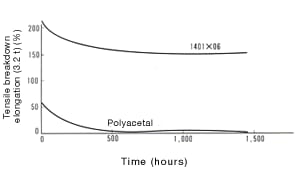 Figure 16-2: Dry-heat resistance of 1401X06 (130°C)
Figure 16-2: Dry-heat resistance of 1401X06 (130°C)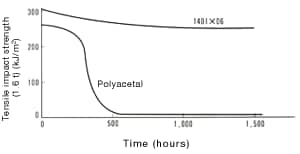 Figure 16-3: Dry-heat resistance of 1401X06 (130°C)
Figure 16-3: Dry-heat resistance of 1401X06 (130°C)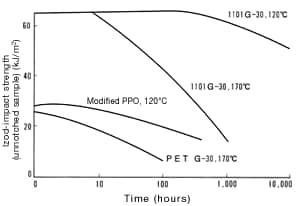 Figure 17: Dry-heat resistance of glass-fiber reinforced resins
Figure 17: Dry-heat resistance of glass-fiber reinforced resins
Ⅲ. Solder resistance
TORAYCON™ glass-fiber reinforced grade (1101G-30) has excellent solder resistance compared to other thermoplastic resins, withstanding temperatures up to 260°C for limited durations of time.
Table 7 shows the solder resistance (at 260°C) of various glass-fiber reinforced grades.
| Name of resin | Soaking time tolerance (s) |
|---|---|
| 1101G-30 | 3 |
| PET G30 | 2 |
| Nylon 6 G30 | 2 |
| Modified PPO G30 | No more than 1 |
Ⅳ. Linear expansion coefficient
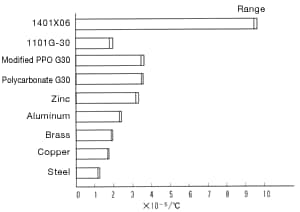
Figure 18: Comparison of linear expansion coefficients
The linear expansion coefficient of TORAYCON™ glass-fiber reinforced grade (1101G-30) is 2.0 x 10-5/°C—a small value relative to other thermoplastic resins and very close to that of aluminum or zinc. For that reason, 1101G-30 can be used in place of aluminum or zinc die casts in some applications. Figure 18 shows a comparison of linear expansion coefficients for various materials.